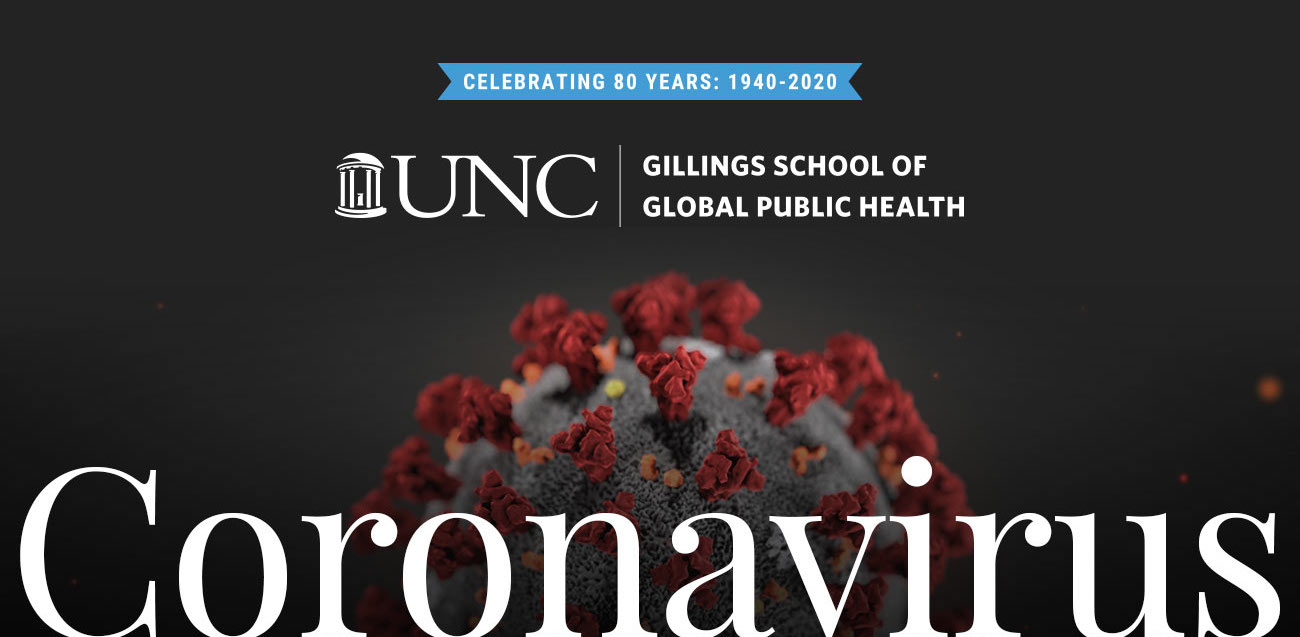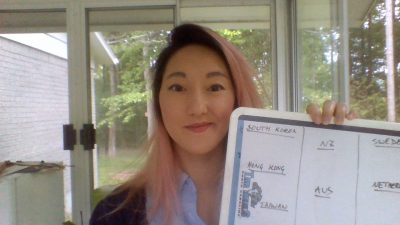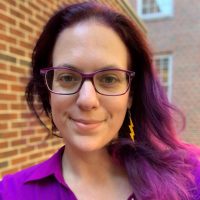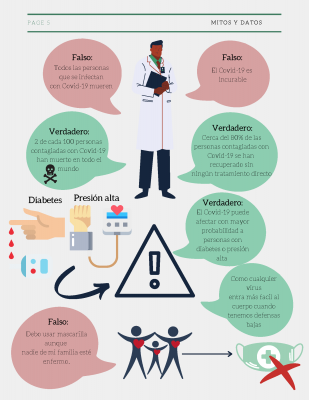The Gillings Community Responds to COVID-19: Keeping Communities Informed

May 11, 2020
The challenge that COVID-19 poses across the globe epitomizes the importance of public health education and research. At the UNC Gillings School of Global Public Health, students, alumni and faculty from across disciplines are working tirelessly to put learning into action in the face of a global health crisis.
Maternal and child health doctoral students address COVID-19 misconceptions in bilingual video series

Caitlin Williams
When cases of coronavirus began impacting our area, Caitlin Williams, a doctoral student in maternal and child health, found herself fielding questions from concerned friends and family. Many were about topics that were false or misconstrued, which led Williams to consider recording some short myth-busting videos for friends and family.
As she formulated a video strategy, a question arose: how do people know what to believe when they are dealing with a deluge of conflicting information?
To tackle the problem of this “infodemic,” Williams credits her mother for suggesting the video series be presented as a place to get carefully vetted information delivered in a calm and straightforward manner. When Spanish-speaking friends also told Williams about the lack of reliable information on COVID-19 available in Spanish, she decided to record the videos in English and Spanish with subtitles to improve accessibility.

In her CoronaChat series, Williams spends a few moments each day clarifying common COVID-19 misconceptions.
And so CoronaChat, Williams’ online bilingual video series, was born.
Available on multiple social media platforms, Williams posts a short video each day addressing relevant COVID-19 topics. She aims to be a “voice of reason” by presenting information clearly and calmly. Her audience, at first comprised of mostly family and friends, is slowly growing and has positively received the series.
“I do think one reason for this is that the series is non-partisan at a time when much of the news coming out about the pandemic is hyper-politicized,” she said. “What’s important right now is distilling the best scientific evidence we have available so that viewers are informed and can take measures to protect themselves and their loved ones.”

Shara Evans
Williams strategizes the content with fellow maternal and child health doctoral student Shara Evans based on topics discussed by those outside the realm of public health. Her sister, Ellie Williams, is a former TV reporter and advises the team on how to frame each topic so it makes sense to viewers. Though they are not experts, Williams and Evans evaluate relevant peer-reviewed papers, pre-prints and other material by infectious disease experts before drafting up a script. Williams’ husband, a PhD-trained immunologist at UNC and a native Spanish-speaker, provides the fact-checking and linguistic guidance.
“We do all of this from scratch every day, Monday through Friday,” she explained. “I have the utmost respect for anyone working in news. It is really hard to work on this kind of timeline, and the pressure to get things right is tremendous.”
In the near future, Williams and Evans are planning to keep producing the videos, but in the long run, they have also considered a weekly podcast where do a deeper dive into more complicated questions that can’t be answered in a 5-minute video.
For Williams, the process of producing CoronaChat has opened her eyes to the need for clear, engaging communication around science and public health.
“Most people are actually pretty interested in these topics, but it’s really hard to get a foothold. Information is so often presented in a dry or very confusing way,” Williams said. “That’s true in this moment, but it’s also true in general. So, as a team, we’re also thinking about how we can take the lessons we’re learning from CoronaChat forward and apply them to other issues in public health.”
Check out CoronaChat on YouTube, Facebook and Instagram.
Master of Public Health student advocates for children and communities of color

Dr. Khadijia Tribie Reid
Khadijia Tribie Reid, MD, FAAP, is a pediatrician and Master of Public Health (MPH) student in the online MPH@UNC program with a concentration in Leadership in Practice. While her day job involves working in practice at MedNorth Health Center in Wilmington, she also balances her coursework with local advocacy.
Since the onset of the coronavirus pandemic, she has been striving to inform her community about the disparate impact that COVID-19 is having on communities of color, often due to higher rates of conditions like cardiovascular disease and diabetes. Such pre-existing conditions make people more susceptible to the worst effects of the virus.
Tribie Reid also aims to increase awareness of other health disparities that disproportionately impact people of color, even prior to COVID-19.
“Unfortunately, just in North Carolina, we’ve dealt with infant mortality rates twice as high for African American babies,” Tribie Reid recently told WECT. “Babies less than one year old are more than twice as likely to die before the age of one than white babies.”
Recently, Tribie Reid reoriented her MPH practicum to focus on increased risks of child maltreatment and childhood adversity during times of social isolation and during natural disasters. As part of the practicum, she is planning a webinar presentation for regional child welfare stakeholders.
Watch the full interview with Tribie Reid and her colleague, Lekeisha Jarrett, MD, on WECT.
Environmental sciences and engineering student promotes COVID-19 awareness to Spanish-speaking communities

Vennela Avula
In addition to her coursework, Vennela Avula, a junior in environmental sciences and engineering, has been coordinating COVID-19 outreach efforts with three different organizations: GlobeMed, Carolina Conexiones and the Women’s Health Information Center.
GlobeMed is a national non-profit organization that fosters partnerships between university chapters and grassroots organizations around the world. The chapter at UNC is the largest undergraduate public health organization and is partnered with the Association for Health and Development Guatemala (ASSADE), a non-profit organization in Guatemala providing critical primary health serves and health education to rural and indigenous communities in Guatemala. In the midst of this pandemic, ASSADE’s main goals are to continue providing primary health care and promote and create awareness about COVID-19 as a tool for prevention.

ASSADE has created an infographic booklet to inform communities in Guatemala about COVID-19. Click to view the full booklet.
To assist with their COVID-19 response, Avula and her colleagues created an infographic manual to assist with preventive education in rural communities. Many of these communities speak different variations of Spanish, so they worked with the leaders of ASSADE to build a manual that was filled with graphics and visuals to make it easy to understand. So far, ASSADE has used the manual in four communities during an intervention that included family prevention kits with supplies to help prevent the spread of COVID-19. Avula and her team are working on a second infographic booklet that will share tools and recommendations related to mental health and how to confront anxiety and stress during quarantine for rural communities in Guatemala.
Carolina Conexiones is a volunteer organization within UNC Hospitals that serves Spanish-speaking families by bridging gaps in health care through non-medical interpretation and general support throughout the hospital. In the midst of this pandemic, the organization has noticed gaps in communication and outreach to the local Spanish-speaking population, especially in Durham. Avula has been working with a Duke physician, Duke medical students and other interested parties to create a series of infographics on COVID-19-related issues for the Durham City Council that are specifically targeted to the city’s Spanish-speaking population. Additionally, Avula and her team have been assisting Spanish-speaker grocery stores in the Durham area in implementing COVID-19 social distancing protocols, handing out masks and providing public health information on coronavirus to shoppers.
Avula also volunteers at the Women’s Health Information Center at UNC Medical Center, but due to the pandemic, the facility is currently closed. Because of this, Avula and several other volunteers have been giving virtual maternity tours of UNC Hospitals to expecting women to update them on COVID-19 policies and prepare them for their labor and delivery.
See more general information about COVID-19 at the Gillings School’s Coronavirus Information Portal.
Read more about how Gillings students and alumni are responding to the COVID-19 pandemic in our previous feature.
Find a roundup of all our experts’ coronavirus-related media outreach in this Twitter moment.
Contact the UNC Gillings School of Global Public Health communications team at sphcomm@unc.edu.
